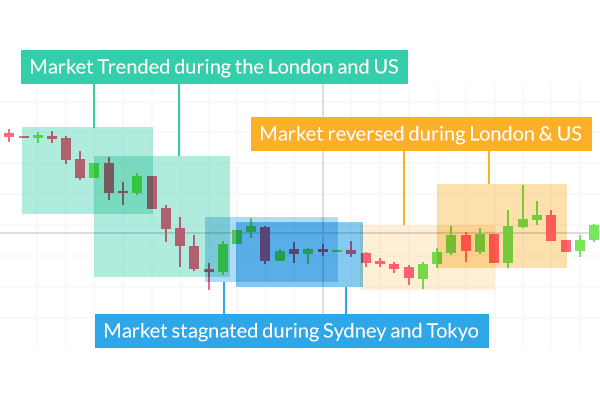The world of financial markets can be vast and complex, leaving investors scratching their heads at times. Two prominent markets that often draw comparisons are the foreign exchange (forex) market and the stock market. While both involve trading assets, there are fundamental differences that set them apart.

Image: www.pinterest.com
In this article, we’ll delve into the depths of these two markets, exploring their distinct features and advantages. From currency pairs to company ownership, we’ll provide you with a crystal-clear understanding of what differentiates forex from the stock market. Join us as we unveil the nuances of these financial frontiers.
Understanding the Forex Market
The forex market is the largest and most liquid financial market globally. It’s where currencies are exchanged, accounting for trillions of dollars in daily transactions. Unlike stocks, forex does not have a centralized exchange but operates as an over-the-counter (OTC) market, connecting banks, broker-dealers, and individual traders.
In the forex market, “currency pairs” take center stage. These pairings represent the exchange rate between two different currencies. For example, the EUR/USD pair indicates the value of the Euro (EUR) in relation to the US Dollar (USD). Forex traders speculate on the fluctuations in these currency pairs, aiming to profit from changes in their relative values.
Exploring the Stock Market
The stock market, also known as the equity market, is where stocks are traded. Stocks represent ownership in publicly traded companies. When an investor purchases a stock, they are essentially buying a small piece of that company. The value of a stock can rise or fall based on various factors, including company performance, industry trends, and economic conditions.
The stock market operates through regulated exchanges, such as the New York Stock Exchange (NYSE) or the London Stock Exchange (LSE). Unlike the decentralized nature of forex, these exchanges provide a centralized platform for stock trading, ensuring transparency and liquidity. Stock exchanges also offer derivative products, such as options and futures, allowing investors to speculate on price movements or hedge their portfolios.
Key Differences: A Comparative Analysis
To further clarify the distinctions between forex and the stock market, let’s explore some key differences:
- Asset Class: Forex involves trading currency pairs, while the stock market deals with company stocks.
- Trading Hours: Forex markets operate 24 hours a day, five days a week. Stock markets, on the other hand, have specific trading hours that vary depending on the exchange.
- Liquidity: The forex market is the most liquid financial market globally, offering traders unparalleled access to liquidity. Stock markets can also provide high liquidity for large-cap stocks, but it may be more limited for smaller companies.
- Regulation: Forex markets are typically regulated by government agencies or central banks, while the stock market is regulated by exchanges and securities commissions.
- Profit Potential: Forex and stock markets both offer potential for profit but also carry risks. Forex traders can leverage their positions, allowing for higher potential gains but also increased risk, while stock traders typically do not have leverage options.

Image: howtotradeonforex.github.io
Tips and Expert Advice for Successful Trading
Navigating the financial markets requires a combination of knowledge and strategy. Here are a few tips and expert advice to help you on your trading journey:
- Research: Conduct thorough research before entering any market. Understand the fundamentals of forex or stock trading, market trends, and risk management strategies.
- Start Small: Begin with small positions and gradually increase your trading size as you gain experience and confidence.
- Use Stop Loss Orders: These orders can help limit your losses in case of adverse price movements.
- Stay Updated: Stay informed about market news, economic data, and geopolitical events that can impact the value of currencies or stocks.
- Avoid Emotional Trading: Emotional decision-making can lead to costly mistakes. Stick to your trading plan and manage your emotions effectively.
Frequently Asked Questions (FAQs)
To further enhance your understanding, here are some frequently asked questions (FAQs) regarding forex and the stock market:
- Which market is more volatile? Forex markets are generally considered more volatile than stock markets due to factors such as geopolitical events and central bank decisions.
- Which market is more profitable? Profit potential depends on individual trading styles, risk tolerance, and market conditions. Both forex and stock markets offer opportunities for profit but also carry inherent risks.
- Can I trade both forex and stocks? Yes, it is possible to trade both forex and stocks. However, it’s important to understand the differences between the two markets and tailor your trading strategies accordingly.
Is Forex Different From Stock Market
Conclusion
Forex and the stock market offer distinct opportunities and challenges for traders. Understanding the differences between these markets is crucial for making informed investment decisions. Forex, with its currency pairs and 24/7 trading, provides a fast-paced environment for speculative trading, while the stock market offers ownership in companies and the potential for long-term growth.
Whether you’re a seasoned trader or just starting your journey, it’s essential to approach both markets with a comprehensive understanding and a robust trading plan. Continuously educate yourself, manage your risk, and seek expert advice when needed. Are you ready to explore the fascinating world of forex and the stock market? Share your thoughts and questions in the comments section below.






